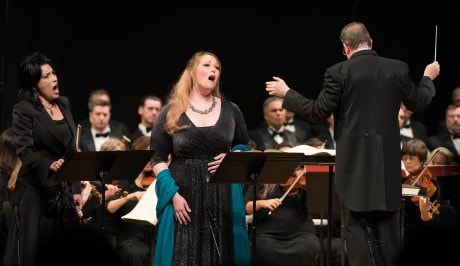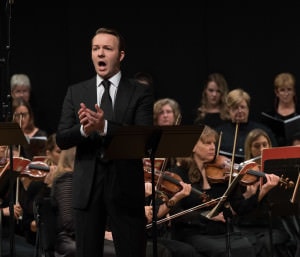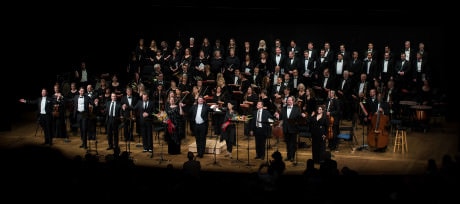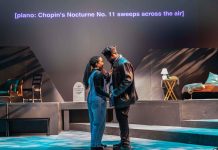The predominance of voice in the operatic tradition usually doesn’t change the need for effective staging to put the full point across. Washington Concert Opera showcased at least one exception to that rule on Sunday evening in a presentation of the large-scale tragedy Semiramide by Gioachino Rossini.

An astonishing performance by mezzo-soprano Vivica Genaux highlighted a stand-and-sing production of Rossini’s ancient tale of monarchs, gods and human frailties before an intensely engaged audience at Lisner Auditorium.
Ms. Genaux’s barnburner of a vocal and acting job while technically just standing in front of a music stand actually came in depicting a character of the opposite sex – not in any theatrical gender-bending sense but according to the tradition of the “trouser role,” the operatic convention of assigning certain young men’s roles to altos or mezzos. Ms. Genaux depicted a young would-be king who is afraid of being seen as a usurper and actually lives for love instead of power – and then discovers the real history of both his intended queen and himself and how close to the bone that really cuts.
If you think of coloratura (or lyrics spinning around roulades of Italian syllables) as being designed only for flighty, toppy sopranos, Ms. Genaux’s singing is a revelation. Her mezzo voice is hearty but not husky, with a pleasing hint of nasality that infuses emotion into every word. When she sends a word or an idea up and down runs, every note is a distinct point of arrival even for a microsecond rather than an approximate touch on the way to some other money moment. The only quibble might be that her volume lags just in the midpoint of her range compared to the lower and upper registers.
Rossini’s vocal lines are complicated but his choice of keys isn’t. He paints in primary colors and his repeated use of the most conventional keys had Ms. Genaux repeatedly landing squarely on middle C, each time burrowing deeper into her/his character of “Arsace,” who as an army commander should lust after the monarchy but really just wants to join his sweetheart (while his rival wants to do both).
This being opera, suffice it to say that not everyone is exactly who they appear to be, in their own minds as well as others’. A change in identity drives the tragic ending of one of the most serious and intense works from a composer better known for his dashing comedies.
As the title character, soprano Jessica Pratt was effective if a bit generic in her singing and interpretation of the evil but eventually conscience-stricken Queen Semiramide. In an Act 2 duet that has Semiramide and Arsace (thus two female singers) engaging in parallel coloratura runs, Ms. Pratt did a nice job of letting Ms. Genaux provide the strong underpinning and floating her voice on top as if it were in a draft of air behind another car.

Tenor Taylor Stayton turned in an excellent performance as yet another suitor for the hand of the girl Arsace loves, as part of the scheming Queen Semiramide’s plot to control the future and hide her own past. Mr. Stayton’s soaring tenor displays perfect intonation and is as bright and pleasing in character as you are likely to hear anywhere. Next month he joins Washington Concert Opera artistic director and conductor Antony Walker in New York for the Metropolitan Opera’s English-language production of Rossini’s The Barber of Seville.
As Arsace’s No. 1 rival, bass-baritone Wayne Tigges put forth a stentorian, sometimes frighteningly stern vocal line, although among the leading singers he seemed most involved with his written score to the detriment of his specific interpretation. Mr. Tigges probably doesn’t realize that he sometimes taps his toe to the music, taking him completely out of character.
A cameo standout was bass Wei Wu as the ghost of Semiramide’s conveniently murdered first husband, who comes back with a few thoughts and threats of his own. Mr. Wu’s voice instantly fills the hall with focus and projection. A member of the Washington National Opera’s Domingo-Cafritz Young Artist program, Mr. Wu is a young singer to follow.
With a substantial orchestra and chorus to direct on stage, Antony Walker’s conducting style is a synthesis of clarity and energy. His beat was exceptionally firm and his interpretive motions conducive to easy interpretation by the musicians. Mr. Walker’s long experience with Rossini that he described in my recent interview with him showed in his handling of Rossini’s famed use of crescendos or volume-raisers to goose the action. He didn’t start the crescendos too early, and he would often pull them back a smidgen to give them additional landing room.
In a nice touch, Mr. Walker would make a specific gesture at the apparent end of set numbers to indicate whether it was a good time for the audience to clap or not. Applause is a notoriously dicey issue across multiple opera styles, although at one point the Lisner audience appeared to overrule Mr. Walker and threw in an extra ovation even though he was ready to go on.
The performance was a one-shot deal, and with that comes some risks and bobbles. The French horns seemed to have trouble getting their sea legs under them in the overture, and full cohesion among all the strings took time to grow. On one occasion each among the singers and orchestra, a performer entered a measure too early, then pulled back and re-entered with the rest of the group. A few choral entrances were not as instantly unanimous as they should be, especially when either the women only or the men only were singing. Experience suggests that these are items that performers would get out of their system in the context of a run of multiple performances.

An excellent job was done with the English super-titles above the stage. They were idiomatically concise in English even where the Italian was flowery, and they did not unnecessarily repeat where the point had already be made, allowing the audience to focus fully on the ensuing vocal gymnastics.
Concert opera is clearly a format that has its place in the local scene, especially for operas that wouldn’t otherwise be heard. The number of important details it takes to make it work seems barely any less than it would take otherwise.
Approximately 3 hours, including one 20-minute intermission.
Washington Concert Opera’s Semiramide was performed one time on Sunday, November 22, 2015 at 6 p.m. at Lisner Auditorium on the campus of George Washington University – 730 21st Street NW, in Washington, DC. For further productions and events by Washington Concert Opera, see their current season listing.




